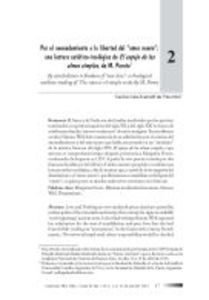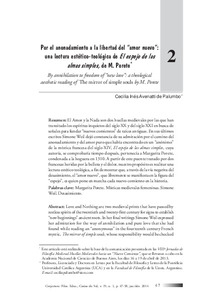Por favor, use este identificador para citar o enlazar este ítem:
https://repositorio.uca.edu.ar/handle/123456789/5259| Título: | Por el anonadamiento a la libertad del “amor nuevo” : una lectura estético-teológica de "El Espejo de las alma simples", de M. Porete | Autor: | Avenatti de Palumbo, Cecilia Inés | Palabras clave: | Porete, Margarita, ca. 1250-1310; LITERATURA MEDIEVAL; ESTETICA; TEOLOGIA; MISTICISMO; MISTICOS | Fecha de publicación: | 2014 | Editorial: | Universidade de Caxias do Sul | Cita: | Avenatti de Palumbo, Cecilia. “Por el anonadamiento a la libertad del “amor nuevo” : una lectura estético-teológica de "El Espejo de las alma simples", de M. Porete = By annihilation to freedom of "new love" : a theological aesthetic reading of "The mirror of simple souls" by M. Porete” [en línea]. Conjectura : filosofia e educação 19-1 (2014). Disponible en: https://repositorio.uca.edu.ar/handle/123456789/5259 | Resumen: | Resumen: El Amor y la Nada son dos huellas medievales por las que han transitado los espíritus inquietos del siglo XX y del siglo XXI en busca de señales para fundar “nuevos comienzos” de raíces antiguas. En sus últimos escritos Simone Weil dejó constancia de su admiración por el camino del anonadamiento y del amor puro que había encontrado en un “anónimo” de la mística francesa del siglo XIV, El espejo de las almas simples, cuya autoría, se comprobaría tiempo después, pertenecía a Margarita Porete, condenada a la hoguera en 1310. A partir de este puente trazado por dos francesas heridas por la belleza y el dolor, nuestro propósito es realizar una lectura estético teológica, a fin de mostrar que, a través de la vía negativa del desasimiento, el “amor nuevo”, que libremente se manifiesta en la figura del “espejo”, es quien pone en marcha cada nuevo comienzo en la historia. Abstract: Love and Nothing are two medieval prints that have passed by restless spirits of the twentieth and twenty-first century for signs to establish “new beginnings” ancient roots. In her final writings Simone Weil expressed her admiration for the way of annihilation and pure love that she had found while reading an “anonymous” in the fourteenth century French mystic, The mirror of simple souls, whose responsibility would be checked after belonged to Margaret Porete, condemned to the stake in 1310. From this bridge plot by two French wounded by the beauty and pain, our purpose is to make a theological aesthetic reading, in order to show that, through the negative way of detachment, the “new love”, which is freely manifested in the figure of the “mirror” is who starts each new beginning in history. |
URI: | https://repositorio.uca.edu.ar/handle/123456789/5259 | ISSN: | 2178-4612 | Disciplina: | LITERATURA | Derechos: | Acceso Abierto | Fuente: | Conjectura : filosofía e educação, Vol. 19, Nº 1, 2014 |
| Aparece en las colecciones: | Artículos |
Ficheros en este ítem:
| Fichero | Descripción | Tamaño | Formato | |
|---|---|---|---|---|
| anonadamiento-libertad-amor-nuevo.jpg | 4,92 kB | JPEG |  Visualizar/Abrir | |
| anonadamiento-libertad-amor-nuevo.pdf | 83,9 kB | Adobe PDF |  Visualizar/Abrir |
Visualizaciones de página(s)
270
comprobado en 30-abr-2024
Descarga(s)
415
comprobado en 30-abr-2024
Google ScholarTM
Ver en Google Scholar
Este ítem está sujeto a una Licencia Creative Commons

